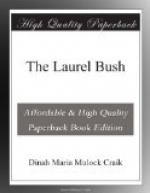When her girls, entering, offered to post her letter, and Miss Williams answered gently that she would rather post it herself, as it required a foreign stamp, how little they guessed all that lay underneath, and how, over the first few lines, her hand had shaken so that she had to copy it three times. But the address, “Robert Roy, Shanghai”—all she could put, but she had little doubt it would find him—was written with that firm, clear hand which he had so often admired, saying he wished she could teach his boys to write as well. Would he recognize it? Would he be glad or sorry, or only indifferent? Had the world changed him? or, if she could look at him now, would he be the same Robert Roy—simple, true, sincere, and brave—every inch a man and a gentleman?
For the instant the old misery came back; the sharp, sharp pain; but she smothered it down. His dead child, his living, unknown wife, came between, with their soft ghostly hands. He was still himself; she hoped absolutely unchanged; but he was hers no more. Yet that strange yearning, the same which had impelled Mr. Moseley to write and say, “Come and see me before I die,” seemed impelling her to stretch a hand out across the seas—“Have you forgotten me: I have never forgotten you.” As she passed through the church-yard on her way to the village, and saw the rector’s grave lie smiling in the evening sunshine, Fortune thought what a strange lot hers had been. The man who had loved her, the man whom she had loved, were equally lost to her; equally dead and buried. And yet she lived still—her busy, active, and not unhappy life. It was God’s will, all; and it was best.
Another six months went by, and she still remained in the same place, though talking daily of leaving. They began to go into society again, she and her girls, and to receive visitors now and then: among the rest, David Dalziel, who had preserved his affectionate fidelity even when he went back to college, and had begun to discover somehow that the direct road from Oxford to every where was through this secluded village. I am afraid Miss Williams was not as alive as she ought to have been to this fact, and to the other fact that Helen and Janetta were not quite children now, but she let the young people be happy, and was happy with them, after her fashion. Still, hers was less happiness than peace; the deep peace which a storm-tossed vessel finds when kindly fate has towed it into harbor; with torn sails and broken masts, maybe, but still safe, never needing to go to sea any more.




